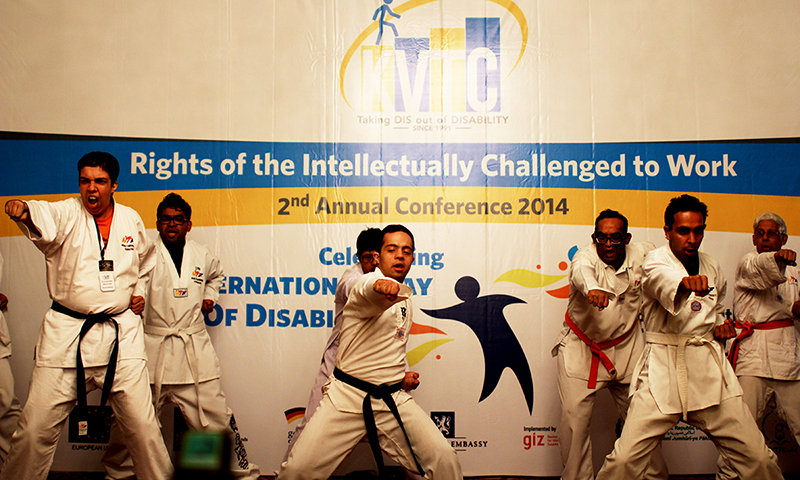KARACHI: It took Hasnain only a few days to master the skills of taekwondo and perform in front of a crowd of hundreds, against the odds of being intellectually challenged.
"Only four days," says Hasnain, standing proud at ‘the rights of the intellectually challenged to work’, an event organised by the Karachi Vocational Training Centre (KVTC) at the Moven Pick Hotel on December 3, 2014.
Hasnain envisions being an athlete: “I'll get a job, earn some money and buy a cell phone," he chuckles.
The institute attempts to help special children like Hasnain towards having a career and being part of a workplace.
The institute aims to train intellectually challenged children for jobs and take on the responsibility to place them in different organisations where their skills can add value. Their vision is already shaping in to success.
Hashma Bin Haroon, who took training at the centre for six years, is now working at Aligarh Institute as a lab attendant for the past two years.
"We have placed over 500 trainees in the work place since our inception in 1991," says Owais Khan, a member of the executive committee at the annual conference.
"The next revolutionary step we are taking is by introducing a technical simulation learning lab."
The lab, introduced for the 'first time in Pakistan', will be equipped to train the persons with special needs in carpentry, welding and automobile spray painting.
The learning will entirely be computer-based with virtual simulation, which will give a close to real-life experience.
"Intellectually challenged persons are more vulnerable and accident prone, so with simulation the risks for accidents will be minimised,” says Khan. We will also be saving on resources and cutting down waste since everything will be taught virtually," he adds.
After imparting technical training, they will be given vocational training i.e. physical training before they are sent out for employment.
One step at a time
“The doctors in America told me that your son will never be able to read or write,” says Gulshakar Porbundarwala. Her son is now 37-years-old and working in a multinational company, but the early years were a struggle to say the least.
“Do not let anyone tell you that development is impossible in your child,” she says.
Another possible venture that was discussed in the conference was promoting volunteerism amongst the youth.
“Social internships and volunteering has been made compulsory in universities abroad, if we do the same in our universities there will be better understanding and acceptance of these children in society,” says Mohammad Ameen from British Council who is visually impaired.
He adds that the concept of volunteerism needs to be stressed so that there’s one-on-one interaction of the special children with members of society.
“Social mobilisation is crucial, there needs to be interaction between regular and special schools,” says former dean special education Munawar Fatima.
“Whoever I have contacted, be it public or private sector, I have never come back empty-handed. All we need is take a step forward.”
What is the government doing?
It took Pakistan 50 odd years to incorporate the right of children aged five to 16 years to have compulsory education, says Nisar Khuhro, senior minister for education and literacy in Sindh.
“I have yet to go through such a portion of the Constitution which addresses education of disabled or intellectually-challenged children. But it not being there shouldn’t stop us from thinking about what can be done,” he added.
Khuhro also talked about the absence of laws for special children. “Rather than just observing the day we should work practically and take ownership even when there are no laws.”
“Disability is a diversity which we do not only need to accept but to celebrate,” said Mohammad Ameen as a closing remark.


















































